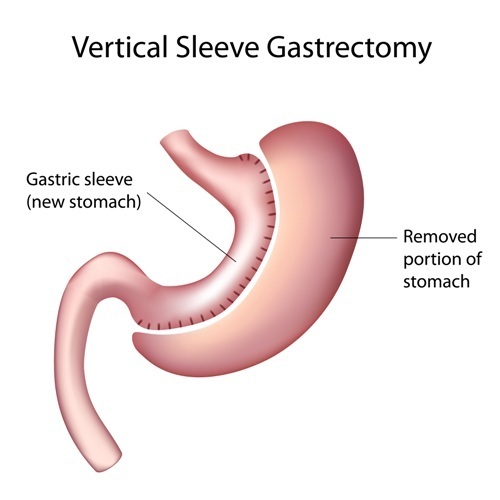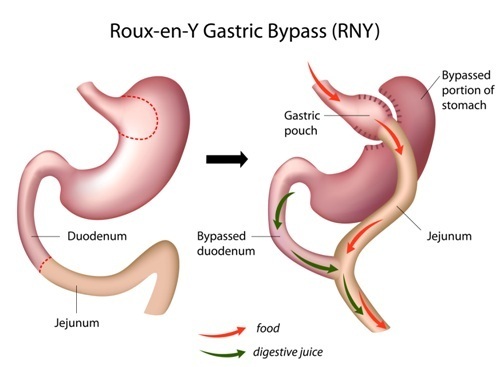We've discussed the benefits of bariatric surgery (for different types, see here) for the obese with or without diabetes, and at this point it's been widely accepted that these surgeries can be very effective in providing substantial weight loss and, often, amelioration of type 2 diabetes (T2DM). Questions have arisen, however, about how long the effects last, and whether the surgeries are more effective than intensive medical interventions. Most of the studies that have found bariatric surgery to be more effective than medical treatment are observational in nature, and thus can't be claimed to describe a causal relationship. A recent report in the New England Journal of Medicine describes a randomized trial comparing two types of bariatric surgery with intensive medical treatment with respect to reducing or eliminating T2DM.
One hundred thirty-four patients were randomly assigned to receive either Roux-en-Y gastric bypass surgery, sleeve gastrectomy, or intensive medical interventions. 

The participants were followed for 5 years, and the primary endpoint was determining the level of glycated hemoglobin (also called hemoglobin or HGB A1C)(1).HGA!C is a way of estimating the amount of glucose in the blood over time: higher levels suggest that diabetes management is ineffective, with too many high values. Diabetic individuals are counseled to try to keep this number at or below 7 percent — in the current study, the goal was a glycated hemoglobin of 6 percent or less. At the beginning of the study, the average HGB A1C was over 9 percent.
By the 5 year time point, at least some of the patients in each group had achieved that goal, with more of the surgical patients doing so than the medical intervention patients. Only five percent of the medical patient group reached A HG A1C OF 6 percent, compared to 29 percent of those receiving gastric bypass and 23 percent of those with sleeve gastrectomies — both these decreases were significantly greater than those seen in the medical intervention group.
There were other changes as well, and again the surgical groups did better than the medical intervention group with respect to weight loss, blood lipids, and decreased use of insulin. The factor that most strongly predicted whether or not a patient achieved the 6 percent goal was whether or not their diabetes had lasted for less than 8 years. Thus, the authors noted, their results emphasize the "importance of early surgical intervention for maximal glycemic benefit."
They also noted that at 5 years, patients who received the gastric bypass lost more weight and needed fewer medications than those undergoing sleeve gastrectomy.
This study adds strong support to previous observational work that found distinct benefits to bariatric surgery. If other, less drastic measures fail, bariatric surgery can still hold out hope that obesity and its medical sequelae such as diabetes can be defeated.
1. Hemoglobin A1C reflects how well an individual's blood glucose has been controlled over the past 3 to 4 months. It is the percent of the hemoglobin in red blood cells that 'picks up' glucose from the blood. These cells have a lifespan of about 3 to 4 months, so their cargo of glucose gives a picture of long-term glucose status.




